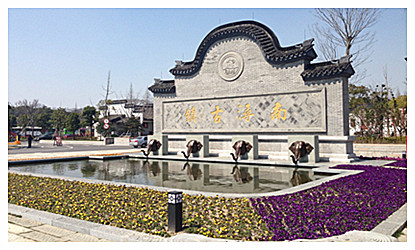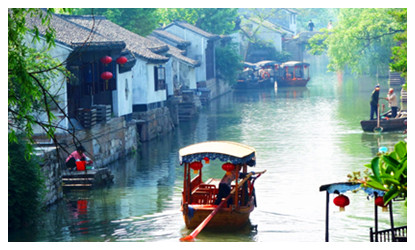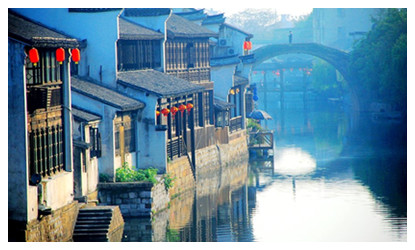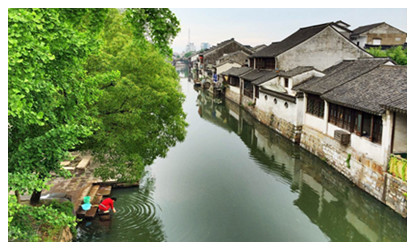Nanxun Water Town
 Nanxun, meaning "South of the Xun River", is famous for it silk production. The fortune of Nanxun stemmed mostly from its silk. The production of silk in ancient China was generally cottage industry that was run by the females of the village. Every family in the village tended the silkworms and harvested the silk thread from the silkworm cocoons. The marerial of the silk is made from the silkworm's cocoons.
Nanxun, meaning "South of the Xun River", is famous for it silk production. The fortune of Nanxun stemmed mostly from its silk. The production of silk in ancient China was generally cottage industry that was run by the females of the village. Every family in the village tended the silkworms and harvested the silk thread from the silkworm cocoons. The marerial of the silk is made from the silkworm's cocoons.
The history of Nanxun Water Town could date back to the 9th century during the Tang Dynasty. At that time, the town was called Xunxi. Some of famous stone arched bridge in Nanxun, including its most famous currently existing bridge, Tong Jin Qiao, was built.
In the Song dynasty, the planting of mulberry and the silk production became popular in this small town. The people in the village made a living by raising the silkworms and producing the silk. However, from Tang to Song Dynasty, the center of silk production in China was sited in Suzhou City, Jiangsu Province, at the northeastern shore of Tai Lake. But by the end of Yuan Dynasty, the heartland transferred to Nanxun, which made this small town known to the world.
 Silk production achieved its peak in Nanxun during the Ming Dynasty. In this time, the technology of raising the silkworms and producing of silk improved a lot. You could the mulberry trees everywhere. And the villagers became wealthy by selling the silk.
Silk production achieved its peak in Nanxun during the Ming Dynasty. In this time, the technology of raising the silkworms and producing of silk improved a lot. You could the mulberry trees everywhere. And the villagers became wealthy by selling the silk.
When it came to Qing Dynasty, Nanxun became an important the silk trade hub, and the raw silk export trade ranked pivotal position in the country. More than six tenths of the villagers in the town worked on the silk industry. The silk shops totaled 56 in the peak time. Among 91 silk shops in Shanghai, 70% of them were open by Nanxun people.
What to see ?
Xiao Lian Zhuang (Lesser Lotus Villa)
Xiao Lian Zhuang used to be the private garden of Liu Yong, a government official and merchant in Qing Dyanasty. The total area of it is 17399 square meters, of which lotus pool is 5267 square meters, and the construction area 3809 square meters. It is divided into two parts: the outer garden and the inner garden. The outer garden is centered by the lotus pool, while the inner garden is centered by the rockery group with stones coming from Tai Lake. The whole garden has the conception of fine quality.
The whole garden has the conception of fine quality.
The lotus flowers in the pond boom in the summer, making colorful and magical scenery in the garden. Xiao Lian Zhuang is regarded as the best private garden in Nanxin, which may have something to do with that it was built by the former richest inhabitant in the town. The walls inside the garden are decorated with paintings, plaques and stelae that are the handiwork of a famous calligrapher.
Jiaye Library Hall
Jiaye Library Hall was a private library constructed by Liu Chenggan in around 1920. The book collection and documents totaled 600,000. the possession of Song and Yuan books reaches 155 kinks. The library is not only famous for its collection of ancient books, but also with renowned woodblock printed books at home.
Former Residence of Zhang Shiming
The former residence of Zhangshiming was built during 1889-1906, by a wealth businessman who brought many foreign luxury goods from western countries to the villagers in Nanxun. The residence has numerous rooms, including salons, halls, studies and  bedrooms. Every chamber owns it special style, with its arched window frames, countless wood-and-brick carving and the unique gothic style tracery.
bedrooms. Every chamber owns it special style, with its arched window frames, countless wood-and-brick carving and the unique gothic style tracery.
Mansion of One Hundred Rooms (Baijian Lou)
There were about one hundred rooms when the building was originally built. That is why it was named Mansion of One Hundred Room. The building is a series of interconnected, one- and two- storey tenement dwellings. It is by far the most complete residential community along the river with traditional style. It could date back over 400 years ago. The length of it is 400 hundred meters.
Travel Tips
Add: Nanxun District, Huzhou City, Zhejiang Province
Recommended time to stay: 1 day
Opening Time: 8:00am – 5:00pm
Best Traveling Time: The four seasons of Nanxun is suitable for traveling, the spring and autumn is the best traveling time. You can appreciate the blooms and attractive green willows in spring.







 Ask Questions ?
Ask Questions ?